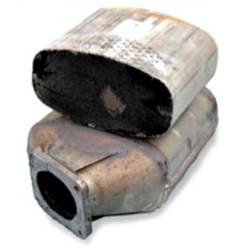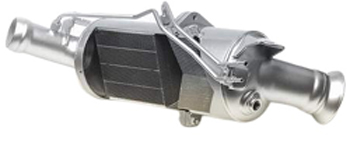Diesel Particulate Filter DPF Problems.
What is a DPF?
A DPF (Diesel Particulate Filter) works to remove harmful particulates of Diesel combustion from exhaust output.
The DPF burns up trapped particles of chemical-laden soot.
Modern vehicles have global emission standards, and the EGR Valve and DPF are part of these standards.
Light-duty Diesels generally adhere to the Euro 4 (from 2005) to Euro 6 (2014), with Euro 7 likely introduced in 2025.
Also, the DPF is located closer to the engine than the muffler.
So problems with the DPF can cause problems with an installed Turbocharger.
Typical DPF Problems and Symptoms

A choked or overloaded DPF, will generally cause a drop in fuel efficiency, and poor acceleration with a loss of power.
You will likely notice an increase in exhaust smell and emissions from the tail pipe.
By this time, if the DPF problem is bad enough, the ECU will signal a warning and throw a code, illuminating the ECL on the dashboard.
And generally the ECU will try to protect the engine and sub-components, by engaging “Limp Mode”.
Habitual low-rev, city driving is the main cause of DPF blockages.
On short trips at low revs, the engine does not get to full operational temperature.
Moreover, this type of driving can cause EGR Valve Problems, as the EGR Valve is also adversely affected by low rev city driving.
So you can see there is a negative feedback loop, of one problem exacerbating the other and so on.
And as previously mentioned, incorrect combustion encourages excess carbon build up.
So if your vehicles Fuel Injector(s) fault, or their seals are compromised, or flanges, fittings or air system pipes are loose or breached, incorrect combustion will cause the same issue.
How do DPF Problems affect the turbocharger?
An old turbocharger can leak oil into the exhaust system, through the EGR and DPF, creating the associated problems cited above.
But with newer Turbochargers, the loop tends to start with an imbalance in oil or gas/air pressures, forcing oil out of the CHRA and into the exhaust system.
That imbalance could come from an EGR Valve issue, and in rare cases, back-pressure from a blocked DPF.
Oil in the exhaust system then contributes again to EGR Valve Problems and DPF Problems.
Once again, there is a circular negative feedback loop created!.
If you catch a DPF Problem early, or habitually drive in a manner as above, you should do the following:
Drive the motorway at the legal limit, and drop down in gears until you reach 2500rpm.
Continue driving for 15 or 20 minutes at 2500rpm.
This will help to oxidise (utilizing exhaust temperature and NO2 as a catalyst) the particulates trapped in the DPF.

We hope that the above information on Diesel Particulate Filter DPF Problems, has helped you in some way.
If you have any other query on our Turbochargers and Parts, please contact our sales support on: 0490 059 316.
